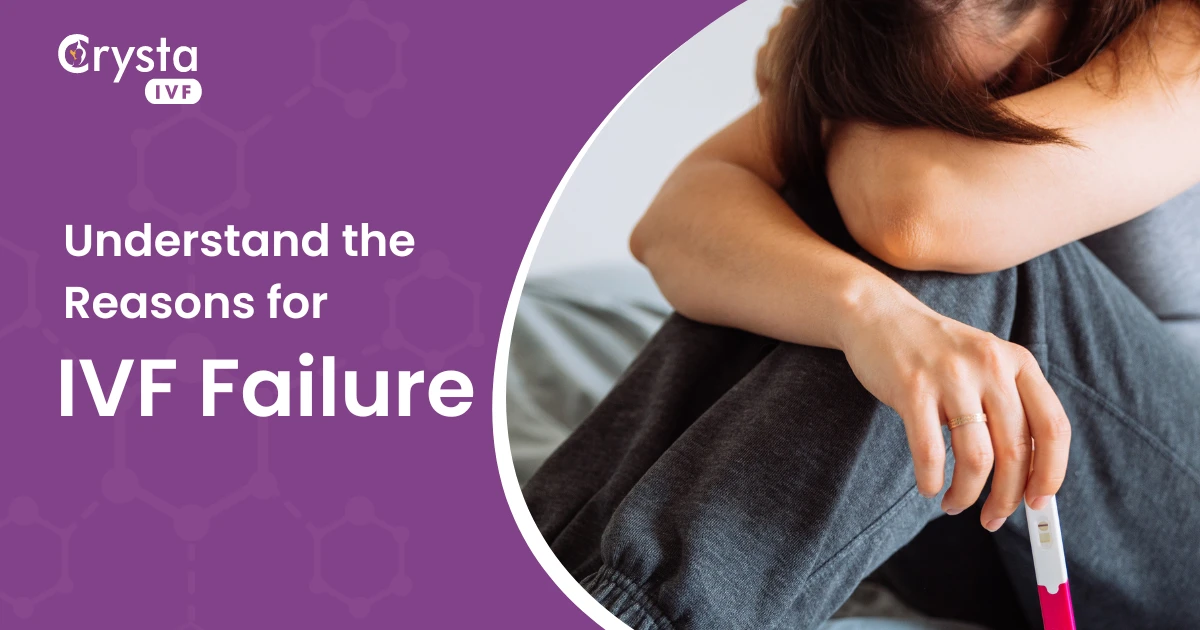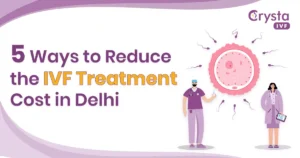Everyone knows about the success of IVF, and many people have heard about its success story, but no one talks about the IVF failure reasons. It is too daunting and consists of emotional and physical trauma. It is not very common that every doctor you meet will tell you about the darker side of IVF treatment and under what conditions it can fail. Most often, people do not even acknowledge this topic, as it is a susceptible and emotional subject for all those who aspire to be parents and plan for a healthy baby.
This article includes all the vital information by breaking the taboo and giving insights into why does IVF fail and how you can deal with it more precisely, but let us first understand what IVF treatment is.
IVF: A bane or a boon?
In-vitro fertilization, the most popular ART form, is considered a boon for millions ofcouples who have failed to conceive for more than a year via unprotected sexual intercourse. Earlier, infertility was considered a curse, but due to the introduction of technology in healthcare, people are overcoming the complex issue regularly.

IVF is the most accepted infertility treatment performed outside the human body, inside a modern laboratory where healthy eggs and sperm combine in a petri dish. So, in all the circumstances, it is evident that IVF is a boon that has helped millions of couples live up to their dreams.
Reasons for IVF failure?
IVF has been a boon for millions of couples and has prominently solved many issues. Nonetheless, many couples faces IVF failure on their first attempt and do not achieve a clinical pregnancy or live birth. There are various reasons why their IVF treatment was unsuccessful or failed.
Causes of IVF failure
With the help of deep research and thorough analysis, we have curated a list of IVF failure reasons for your better understanding:
Female Age:
Female age plays a crucial role in deciding IVF success. When a woman ages, her tendency to produce healthy, mature eggs decline. Women are born with 6 million eggs; by 30, their eggs begin to decrease drastically, and only a few remain in the ovaries by 50.
Poor egg quality:
It is considered as one of the top IVF failure reasons. High-quality eggs develop a healthy embryo and easily get implanted into the uterine lining. In contrast to high-quality eggs, poor-quality eggs neither develop a healthy embryo nor get attached to the uterine lining.
Lower sperm health:
Fertilization will never happen if a sperm fails to reach the centre of an egg to form an embryo. Low sperm count and poor health characterize male infertility.
Chromosomal abnormalities:
Another reason for an IVF failure is chromosomal abnormalities. Your embryo has a missing, extra, or irregular proportion of chromosomal DNA, which results in IVF failure. These anomalies can also be passed down.
Unhealthy lifestyle:
Maintaining a healthy lifestyle is essential in a natural pregnancy, and it becomes even more critical when undergoing IVF treatment to increase the likelihood of success. Tobacco use, alcohol consumption, drug use, and caffeine use—these toxic substances harm your fertility and are one of the reasons why IVF fails.
Implantation issues:
The implantation issue occurs when the embryos fail to implant in the uterus. It usually occurs due to the presence of uterine polyps, a premature increase in progesterone levels, a too-thin endometrial lining, or an infection of the uterus. Thus, always keep in mind that you are not to blame if an embryo fails to implant.
Inappropriate lab conditions:
For a successful IVF treatment, it is necessary to have a modern laboratory with appropriate lab conditions. As everything is adequately controlled inside the lab. So, if lab conditions are found to be poor, it directly impacts the success rate of IVF and leads to IVF failure.
Embryo selection method:
The embryo selection method is recognized as one of the common reasons for IVF failure. The selected embryos are transferred into the woman’s uterus. However, irrespective of all the technical advancements, sometimes the ability to differentiate a chromosomally normal embryo from a chromosomally abnormal embryo remains limited. In some cases, the viability of these embryos is subject to biological variation and becomes one of the top IVF failure reasons.
Here is an expert senior IVF consultant, Dr. Poonam Mishra from Crysta IVF, Lucknow who is talking in detail about recurrent implantation failures:
What happens next when the IVF fails?
Many couples believe that after an IVF failure, nothing is left in their lives, ending their lifelong dream of becoming parents. But you do not have to lose hope yet. The world is not at an end; get an honest estimate of your health from your IVF doctor and plan for a second IVF.
According to research, the second attempt at IVF after a failed first attempt has a higher chance of success. It can be a little exhausting to do a second round of IVF, but you should also know that you are not the only one; many couples have opted for a second round of IVF and were overwhelmed to get successful results.
Learn more: Significance of three full cycles of ivf
Talk to an IVF specialist!
To be able to conceive is a dream come true for many couples, but the harsh reality is that not everyone gets success in their first attempt at IVF. Sometimes, to be able to start an IVF pregnancy, you have to go through a lot. From emotional, psychological to financial factors, everything can prove to be draining. However, when you carry your baby in your arms, everything feels worth it.
Therefore, it is better to enhance your likelihood of success and lower down the risk of IVF failure reasons by consulting the top fertility doctors at the renowned Crysta IVF, the best IVF centre in Lucknow.
A team of fertility doctors will closely monitor your health condition and plan your treatment accordingly using advanced methods and modern labs to ensure that the possibility of IVF success is not jeopardized at any cost.




